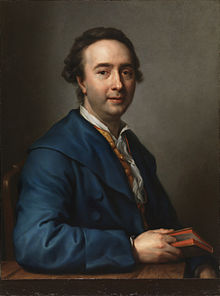José Nicolás de Azara

Don José Nicolás de Azara , Duke of Nibbiano (born December 5, 1730 in Barbuñales near Barbastro in Aragon , † January 26, 1804 in Paris ) was a Spanish politician , diplomat and patron of the arts. He was the older brother of the naturalist Félix de Azara .
Life and Political Work
Azara studied law and literature in Huesca and Salamanca , completing his studies with a doctorate. As an official in the Foreign Ministry he was under Charles III. 1765 envoy in Rome . Here Azara worked as a diplomat for the next 33 years, first as General Procurator and from 1785 to 1798 as Spanish Ambassador .
Azara had a special share in the ban on the Jesuit order by Pope Clement XIV on August 6, 1773. After Clemens' death he was in the election of Pius VI. helpful. During his pontificate, Pius had to deal with the declining influence of the Catholic Church on politics. In 1783, Azara successfully mediated the dispute between the Vatican and Joseph II , who wanted to establish a state church in Austria.
Azara also played an important role in the negotiations on the Peace of Basel on July 22, 1795 between France and Spain. When the French occupied Rome for the second time in 1798, he withdrew to Florence , where Pius VI. had been banished. After the Pope's deportation and his death in Valence in 1799, he acted on his behalf and on behalf of him until the successor Pius VII was elected by the conclave in 1800 .
From March 1798 Azara was the Spanish envoy in Paris . He pursued a course friendly to France and on March 27, 1802 concluded the Peace of Amiens for Charles IV of Spain . He also led the negotiations between Spain and France that led to the Third Treaty of San Ildefonso of October 1, 1800, in which Spain ceded Louisiana territory to France and ultimately surrendered itself completely to Napoleon .
In November 1803, Azara was dismissed from his post as ambassador and died a few weeks later.
Art patron
José Nicolás de Azara was not only a diplomat, but also an art collector and art patron . In Italy he acquired a collection of Greek portraits, which he gave to Charles III. and which is now kept in the Prado in Madrid. He also helped the now-forgotten Irish scientist William Bowles (1720–1784), who had no knowledge of Spanish, with a translation of his main work An Introduction to the Natural History and Physical Geography of Spain to a publication of the book.
Azara particularly supported the painter and writer Anton Raphael Mengs , with whom he was friends, with the publication of his works. Azara wrote that Mengs, after his return from Rome , August III. presented some portraits as work samples:
- Since the latter doubted that a boy at such a tender age could produce a work of such great perfection, Sr. Majesty ordered that in the presence of an Italian painter who was a pupil of the famous Rosalba Cariera he should make a portrait of hers Man should manufacture. He did it, and the king was so pleased with it that he immediately let him grind himself. (quoted from Lit. Prange).
useful information
The genus Azara from the willow family was named after José Nicolás de Azara.
literature
- Javier Jordán de Urríes y de la Colina: José Nicolás de Azara, protector de las Bellas Artes. In: Christoph Frank (Ed.): Spain and Portugal in the Age of Enlightenment. Vervuert, Frankfurt a. M. 2002, pp. 81-97, ISBN 3-89354-518-2 .
- Obras de D. Antonio Rafael Mengs, primo pintor da Camera del rey, Publicadas por Don Joseph Nicolas de Azara. Madrid 1780.
- Works of Anthony Raphael Mengs / published by the Chev. Joseph Nicholas D'Azara London 1796: Faulder (among others)
- Gabriel Sánchez Espinosa: La biblioteca de José Nicolás de Azara / Calcografìa Nacional, Real Academia de Bellas Artes de San Fernando . Madrid: 1997.
- Christian Friedrich Prange (Ed.): The knight Anton Raphael Mengs (...) left works, (...). Hall 1786.
Web links
- Literature by and about José Nicolás de Azara in the catalog of the German National Library
- Azara, José Nicolás de. In: Gran Enciclopedia Aragonesa (Spanish)
- Biography at www.napoleon.org (English)
| predecessor | Office | successor |
|---|---|---|
| Jerónimo Grimaldi |
Spanish envoy to the Holy See 1784–1798 |
Antonio Vargas Laguna |
| Federico Gravina |
Spanish envoy to France 1798–1803 |
Federico Carlos Gravina y Nápoli |
| personal data | |
|---|---|
| SURNAME | Azara, José Nicolás de |
| BRIEF DESCRIPTION | Spanish politician, diplomat and patron of the arts |
| DATE OF BIRTH | December 5, 1730 |
| PLACE OF BIRTH | Barbuñales near Barbastro , Aragon |
| DATE OF DEATH | January 26, 1804 |
| Place of death | Paris |